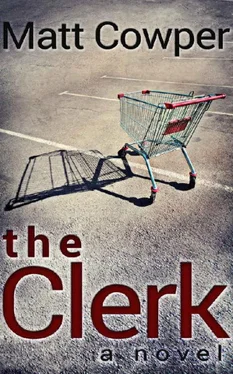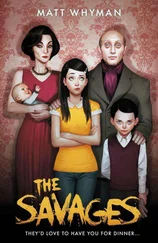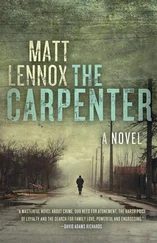“No. I don’t think your mother and I would get along as instructor and student.”
Thomas smirked. He could imagine the scene: Jean gushing that “you’re improving so much, and, oh, look at how real that tree looks! Your style reminds me of someone… who was it… yes, Caiden Willis, who I knew back in Morehead City. You know he moved away, became a graphic designer somewhere, believe it was Chicago, don’t know what he’s doing now…” and Frank replying that “this overdone praise doesn’t help me. I want to paint , dammit. And please stop going off on a tangent about old friends.” It was like this for every hobby, which was why they tried to keep their interests separate.
“I’m taking an Adult Learning class at the community college,” his father continued, “but it’s too slow for me.” This did not surprise Thomas. He could picture the instructor driven to frustration by his father’s hectoring questions, and the fluffy housewives intimidated by the way he attacked a canvas. This mental picture bore a strong resemblance to reality.
“Sounds good,” Thomas said. “Gotta keep active in your retirement, right?”
“I’ll always be active,” Frank Copeland stated. “The rolling stone gathers no moss.”
“Rolling stone… huh, that reminds me of Sisyphus. You know that myth?”
“No,” was the gruff response. Frank Copeland hated not knowing something, and he especially hated it when his son was the one who pointed out his ignorance.
“Well, it’s an interesting myth.”
A pause as long as a winter’s night.
“I need to go to the bathroom,” Thomas said, as a way to escape. “By the way, where’s Dennis?”
“In his room. Playing those video games, I expect.”
To Frank Copeland, video games were the biggest time-wasters ever conceived. He didn’t know why supposedly smart people killed their brain cells shooting up characters on a screen when they could be improving themselves. His own son had been passionate about video games when he was a kid, something that still rankled him.
Thomas was recalling this passion himself. He remembered vividly when the original Nintendo console came out, way back when he was in elementary school. He’d played it at a friend’s house, and immediately had to have it. He’d never experienced anything like it. He’d heard of something called “Atari” at some point, but he didn’t exactly know what it was. The Nintendo, however — even in his schoolboy brain, stuffed with state capitals and “in 1492 Columbus sailed the ocean blue,” he knew that it was Huge.
But his father swore he’d never buy such a thing for Thomas. His mother was more receptive — mainly because other mothers told her the Nintendo kept their children engaged for hours, instead of tearing through the house like they usually did — but in this matter Frank Copeland would not budge a millimeter.
“If you want this thing, buy it yourself,” he told his son.
At the time, Thomas and Emily were paid $10 per week, which they earned by washing dishes after supper, picking up pine cones, and sweeping up pine straw in the yard, all of which had to be done according to their father’s exacting standards. Frank Copeland wasn’t going to just hand his kids money; they would have to earn it.
Thomas spent his money as quickly as he earned it, mainly buying comic books and sweets, and so Frank Copeland did not believe his son had the discipline to save up the $199 a retail Nintendo console cost. And so, to him, the matter was closed.
But weeks passed, then months, and his wife occasionally reported that Thomas wasn’t spending his earnings as he had been. He’d spend a dollar or two here or there, but the bulk of it, she assumed, went into the shoebox he used for the storage of rocks, marbles, baseball cards, and interesting dead things. Suspicious, Frank confronted his son one day, and was alarmed when a reluctant Thomas opened the shoebox and counted off $175.30.
“What’re you saving up for?” Frank demanded.
“A Nintendo,” Thomas replied, as if his father were a numskull for asking such an obvious question.
“Son, don’t you think you could spend that money on better things? Or not spend it at all, save it for a rainy day. We can set up a savings account for you…”
“I’m going to spend it on what I want, and what I want is a Nintendo.”
The Nintendo was soon bought, and Frank Copeland sat in his recliner, reading the paper and stewing, while Mario blipped and blooped across an 8-bit wonderland on the living room’s television.
As the years passed, Thomas bought more and more games, but his $10 per week salary only went so far. His father wouldn’t raise it, claiming that Thomas “ought to be happy with what you get. When I was your age I went without.” Thomas pinched every penny until it squealed, then he pinched some more, until Old Abe was begging for mercy.
There were also other video game systems that enticed him: the Sega Genesis, the Game Boy, the TurboGrafx-16, but he recalled how hard it had been to save up for the Nintendo. He could do it again, sure, but it would be extremely difficult.
One day at school, Thomas overheard a fateful conversation at a nearby lunch table. One of the jocks was talking about his job at Oxendine’s Grocery: “It’s so fuckin’ easy, and Vernon Oxendine’s hilarious. Ya’ll should come work there. He’s hiring, you know.” The other people at the table demurred, claiming that working at a grocery store was for dumbasses, but Thomas was interested. A job would solve his money problems. He was a freshman by now; he was old enough to work. He imagined a massive video game library in his room, dozens of game cartridges stacked on a shelf in alphabetical order, and various consoles sitting by the small television he’d gotten for Christmas last year, ready to be fired up. His father wouldn’t buy him any games or consoles, but he could justify buying a television. This way, his son could play in his own room, and not pollute the living room with those damnably repetitive sound effects.
After school, he got Brandon, an older sort-of friend who had a car, to drive him over to Atlantic Beach, where the grocery store was located. The store was right on the corner of Atlantic Beach’s big intersection. Compared to the chain supermarkets, it was tiny, but, owing to its location, it did a brisk trade during the summer months; Thomas had been in there when it was crammed with tourists either going to or coming from the beach. Now, however, it was fall, and there were only four cars in the cracked, dusty parking lot.
Thomas went inside, his heart pounding. A few minutes later, he walked out, smiling and practically skipping.
“What happened?” Brandon asked as he blew smoke out of his nostrils. To Thomas, who’d never even smoked a cigarette, this looked very fucking cool. “Did you get hired?”
“Oh yeah,” Thomas said proudly. “Mr. Oxendine — Vernon — said he liked the looks of me. I start this weekend.”
“Congrats, man,” Brandon said, offering his hand for a high five.
“Thanks, Brandon.”
His father was not so congratulatory.
“Why are you going to work there ?” he asked. “There’s plenty of work to be done at the furniture store.”
“I don’t want to work there.”
“Why not?”
“I just don’t.”
This wasn’t the first time Frank Copeland had asked his son to work at Copeland Furniture, and this wasn’t the first time Thomas had rejected such employment. Thomas had heard his father complain about his “lazy” and “surly” employees enough to know he’d be miserable working there. He already put up with enough shit as it was. If his father caught him sweeping pine straw without sufficient alacrity, he would yank the rake out of Thomas’s hands and show him how it was supposed to be done. It was the same for dishwashing, lawn-mowing, and every other task Thomas had to do to get his measly $10 a week.
Читать дальше












